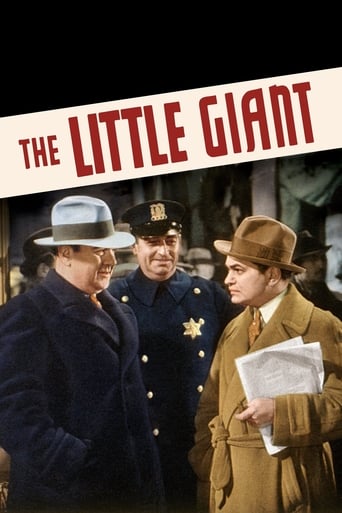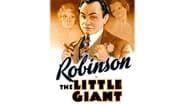bkoganbing
Edward G. Robinson who would occasionally channel his gangster image into comedy roles does it for the first time here in The Little Giant. He plays a gangster from Chicago named James Ahern aka Bugs Ahern who has seen the end of Prohibition and has wisely salted away his money. Wanting a little class and wanting to mix with the upper crust he moves to Santa Barbara and starts mixing.Unfortunately he mixes with a family of society crooks father Berton Churchill, mother Louise Mackintosh, son Donald Dillaway. Worst of all he falls for Helen Vinson playing one of her patented bad girl roles who is a notorious flirt. Robinson has rented a mansion from down on her luck society girl Mary Astor who along with thousands of others had her savings wiped out by investing in the junk bonds that Churchill's firm sold. And now he's sold the firm to Robinson.No one makes a sucker out of Robinson and he settles the matter with some friends imported from back east who do it Chicago style. The real Bugs Moran would never have been this gentle as Robinson's old beer salesmen were in The Little Giant.Robinson got deserved kudos for essaying comedy and he would do it many times in his career. You have to see how he and his friends play polo Chicago style.A must for fans of Edward G. Robinson.
GManfred
Prohibition ends and gangster boss Bugsy Ahearn, like so many during the depression, finds himself unemployed. What to do? Fortunately, he has laid aside much of his ill-gotten gains and has no money worries. So he decides to improve himself, to acquire some culture and move in elite circles. And therein lies a very funny story.Edward G. Robinson shows a flair for comedy and shows off some of his immense talent as a social climber who decides to shoot the moon. He moves from Chicago to the West Coast, buys a mansion and falls for a lady from a family of swindlers, and generally falls into a series of mishaps, each one funnier than the last. He gets excellent support from Mary Astor, who becomes his guide to the finer points of becoming 'quality'.You will gain great respect for Robinson if you've only seen him in tough-guy roles, as he carries the picture as a society naif in this written-for-the-screen comedy. There are no dead spots, either, as the story moves along briskly in an enjoyable 75 minutes. It was shown at Cinefest, Columbus, O., 6/13.
MartinHafer
This film begins with the election of Franklin Roosevelt and an end to Prohibition. As Edward G. Robinson is the head of a gang selling illegal liquor, he knows his days of riches and glory are over. Instead of continuing in a life of crime, he wants to return in style and live among the gentry. The only problem is that although he thinks he's got class, he's a total clod...a likable clod, but a clod nonetheless. And, in society, he sticks out like a sore thumb. He is only accepted, eventually, by some selfish swells who only want him around for a chance to drain him of his money. The problem is that Robinson is such a sucker, he has no idea he's being played. At the same time, his personal secretary (Mary Astor) has fallen for him and she knows what sort of people his new "friends" really are but is afraid to tell him.Despite Robinson being an ex-crook AND chump, he's excellent here because no matter what he was like, you can't help but feel sorry for him. There is a certain vulnerability and charm about him--making this film work very well. He also seemed to have a nice knack for comedy--something that would become very apparent with later successes such as THE WHOLE TOWN'S TALKING and LARCENY INCORPORATED. His friend and sidekick, Russell Hopton, is also quite good--and it's surprising that he didn't get more work with such excellent performances.Overall, this is one of the best gangster flicks of the 1930s. Exceptionally well written and acted, and especially great in the end. Fully of laughs and wonderful moments--especially when his friends from Chicago come to save the day. A film not to be missed.
fowler1
Although the early sound era presented some problems - such as stationary camera shots with the actors nailed to their marks, and minimal use of background music resulting in long stretches of torpor - by 1931 most of these bugs had been corrected; thus the pre-censorship period of '31-'34 is chockfull of some of the most vigorous, creative and satisfying movies of Hollywood's Golden Age, however little-known many of them may be. LITTLE GIANT is one such hidden gem. A lightning-paced gangster comedy from the Warner-First National studio (where speed and economy were stylistic hallmarks), it's fast, funny and flippant in a manner that the decayed virgins of the Hays Office would render, if not impossible, at least awfully difficult after '34. Edward G Robinson plays Bugs Ahearn, a Chicago bootlegger put out of business by Prohibition's repeal, who decides to relocate to California and buy his way into society. Once there, he's immediately preyed upon by the type of 'respectable' vipers & parasites his background has left him ill-equipped to recognize, let alone fend off. This 'fish-out-of-water' comedy benefits greatly from a cheerfully amoral tone and a slew of zesty performances, not least of them Mary Astor's as a busted heiress who is the only non-hood here who's on the level. The mix of slapstick and rat-a-tat verbal comedy, coming at you at fast as it does, works very well, and nobody was better at this kind of hectic farce than the woefully-underrated Roy del Ruth, who was one of a number of sure & steady craftsmen who hit their peaks only under the Warners' aegis. In Del Ruth's case, the coming of the Code (and his subsequent move to MGM) proved to be disastrous: though he continued to direct till the late 50s, his post-Warners work was so drained of zest and inspiration that he is hardly remembered at all today. Even the auteurist crowd dismisses him as a competent hack. But do yourself a favor and seek out everything he did prior to 1935, and you'll be rewarded with a body of work that will surprise you with its cynical bite and confident staging. They play as well today as they did the day they opened. (Highly recommended, besides GIANT, are BLESSED EVENT, LADY KILLER, EMPLOYEES ENTRANCE & TAXI.)




